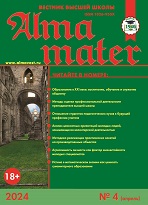UDC (37.09+378+811.111)::005.6
https://doi.org/10.20339/AM.03-20.049
I.V. Slesarenko is Cand.Sci. (Pedagogy), doc. e-mail: slessare@tpu.ru; and A.G. Bogdanova is Cand.Sci. (Philology), doc. National Research Tomsk Polytechnic University
Discussed are organizational and methodological issues of evaluating quality of teaching, performed by English in-house training courses instructors, the courses are developed and delivered in compliance with the university demand. At present, training in English has certain specifics related to the necessity to apply the learning outcomes in professional performance of university research and teaching staff immediately after training courses completion. English training courses instructor becomes one of the key elements within this teaching and learning process. Effective realization of outcome-based English teaching depends on English training courses instructor, thus enabling interrelation of the courses learning outcomes with the university goals within its research and education internationalisation. Teaching and learning quality assurance within English in-house training courses becomes vital. Questionnaire as instrument for evaluating professional qualities and values of English training courses instructor allows to form the awareness about the learners — course participants experience in relation to the courses organizational, methodology issues as well as desirable personal professionally viable values of English training courses instructor. The paper discusses the results of piloting the questionnaire within Tomsk polytechnic university English in-house training courses provided for university research and teaching staff. The objectives are to verify teaching and learning quality, gather the expectations related to professional portfolio of English training courses instructor. In perspective this will enable to form criteria to professional portfolio of English training courses instructor engaged in English language training provision to university research and teaching staff.
Key words: English language, research and teaching staff, questionnaire, university training courses, training effectiveness, professional competences, personal professionally viable values, teaching, outcome-based learning.
References
- Project on raising competitiveness of leading Russian universities among leading world scientific educational centers. URL: https://www.5top100.ru/
- Plan for measures on realization of the program of raiding competiveness (‘road map”) of TPU for 2013–2020 years. Tomsk, 2013.
- Senashenko, V.S., Pykhtina, N.A. Continued professional education as key factor for improvement of educational system. Alma mater (Vestnik vysshei shkoly). 2019. No. 3. P. 27–33.
- Aldahdouh, Z.T., Nokelainen, P., Korhonen V. Innovativeness of Staff in Higher Education. International Journal of Higher Education. 2018. No. 2. P. 43–57.
- Ganitcheva, I.A., Patrikeeva, E.G. Study in professional psychological competency of a pedagogue. Higher education today. 2019. No. 11, P. 49–53.
- Barrett, M., Byram, M., Lazar, I., Mompoint-Gaillard, P., & Phillipou, S. Developing Intercultural Competence Through Education. Strasbourg, 2013.
- Dunworth, K., Iwaniec, J., Grimshaw, & Mckinley, J. Language and development of intercultural competence in an “internationalised” university: staff and students perspectives. Teaching in Higher Education. Nov., 2019.
- Slesarenko I., Frantcuzskaia E., Bogdanova A., Fedorova N., Polonskaya M., Page M., Sheveleva S., Furman N. Internationalzing University in it,s Entirety: a System for Providing a Comprehensive Training Programme for All Staff. Seville, Spain. P. 9299–9309
- Kormos, J., Kata Csizér, K., & Iwaniec, J.A mixed-method study of language-learning motivation and intercultural contact of international students, Journal of Multilingual and Multicultural Development. 2014. No. 35. P. 151–166.
- Harkness, J.A. Comparative survey research: Goals and challenges. In: International handbook of survey methodology. New York, 2018.
- Dornyei, Z. Questionnaires in second language research: Construction, administration, and processing. New York, 2010.
- FZ “On education in the Russian Federation” No. 273-FZ from 29 December 2012 with changes of 2017-2016. URL: http://zakon-ob-obrazovanii.ru/
- Soloivova, E.I. Methodical preparation and re-preparation of teacher in foreign languages: integrative-reflexive approach. Moscow, 2004.
- Khutorskoy, A.V. Key competences as component of personally oriented education. Popular education. 2003. No. 2.
- Adolh, V.A. Training of pedagogue for innovative activity in the process of professional formation. Alma mater (Vestnik vysshei shkoly).











.png)






